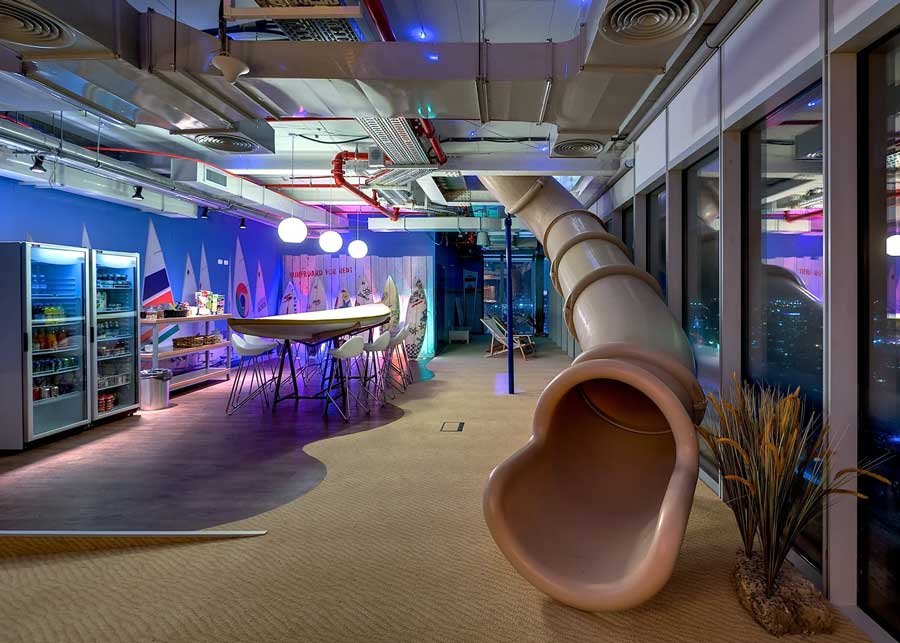“Work doesn’t have to be fun — That’s why they call it work.”
It sounds like a phrase straight from the mouth of an authoritarian manager. But workers nowadays actually do believe that work should be fun. And perhaps more importantly, it must be meaningful. But why is that anyway?
A Happy Office
We set so many requirements for the perfect job. Not only must the hard conditions be good (enough dollars per hour) and offer the prospect of better conditions (promotions, more vacation and leave days), but softer conditions also play an increasingly important role.
Do I get a company car? Can I schedule my own hours and work from home? And does the company do after-hours drinks, fun team-building activities or perhaps trips abroad at the boss’ expense?
This trend is not going unnoticed by HR departments. Companies are coming up with the craziest perks to attract talent and keep them on board.
Gone are the drab cubicles of the 1970s (thankfully). Many companies now have flex workspaces with bean bags, ping pong tables, cold brew taps, meeting rooms with ball pits, and gym facilities. An average Silicon Valley office looks more like an amusement park for adults than a place where people work on tech that shapes our daily lives.
All those perks that come with the job are somewhat insidious. Your boss isn’t really all about creating the most pleasurable environment for you; it’s about making you stick around as long as possible.

Why Aren’t We Working Less?
Strictly speaking, we have been working less and less over the past 200 years. We contribute less and less manpower to the production process, but have moved to directing machines, computers and lower-level personnel. Instead of diligent labor from which our hands became calloused, these days our silky-smooth palms rest on keyboards at a desk in the office.
We owe the downward trend to the industrial revolution and to the fact that there are now more two-income households sharing the financial burden of the family.
This also expresses itself in numbers. As the chart below shows, we work only about half the hours of an average worker in 1900. At least, in the Western world; Asian countries show a steady trend of long working hours over the past decades.
Needless to say, this is a magnificent progression and a clear example of how technology is making our lives easier. Nevertheless, my question is why don’t we work even less. When I look around at all the jobs and how they are being done, I think they could all be many times more efficient. Moreover, I think our lives will be happier as a result, hear me out:
The Social Slump
With the transition to office jobs, something new has also emerged: office culture.
Different departments have been set up and hierarchical layers of management added, so that the organization can operate as efficiently as possible. Although, that was the intention. In reality, much of the time is spent on long meetings, internal and external communication and informal conversations. Work has a greater social aspect than ever before.
Social interactions in the workplace allow you to blow off steam and think about something else than the task at hand. For one thing, it takes the raw edge off of work as such; you’re suffering together. Being able to stick it to boss by chatting during office hours feels good.
Colleagues become more than workmates; on weekdays you spend more time with them than with your friends, partner or family.
We can see this very clearly in the following chart:
The average 18-year-old still regularly meets with friends, more than 2 hours a day. Over the course of our working life, this drops rather rapidly to half an hour; four times less. We see a similar downward trend for time spent with family. By the time we are 24, we spend more than 200 minutes a day with coworkers. The moment you have children, there is even less time to spend with friends, but time spent with colleagues remains stable.
If we were to remove the social aspect from work and cut down on the unnecessary meetings, work becomes a lot more efficient. Instead of 40-hour work weeks consisting of five days with 9-to-5’s, there would likely only be 16 or 24 hours left. Just think what that can mean for your social life outside of work. Suddenly you have more time and opportunities to meet up with friends, you can spend more time with your partner and children, and your parents can count on more frequent visits as well.
Why People Hate Their Jobs
I think the notion of a fun, meaningful job is mostly a Western thought. In Asian countries, people are much more willing to accept that jobs come with duties. For them it is okay to be just a cog in a much larger machine, as long as you can put rice on the table.
To advocate to recent graduates that you should find work that is fun, and that it can be found within any field, is just plain cruel. The shattering of that false image that is created, causes many to doubt whether they have chosen the right job.
That’s why many young people end up with burnout or depression within just a few years after getting their first real job. The transition from a care-free study environment to the tormenting reality of the corporate world is too overwhelming.
It is not realistic to expect to find a job where you are well paid, your personal life does not suffer, you get up every day fired up with passion to make the world a better place and where all your colleagues are also your best friends.
The harsh reality is that the the pile of work never ends, you will never get enough appreciation from your manager and your impact on the overall business is less than you had hoped. Not exactly things that make work fun.
“Don’t count the days, make the days count.’’
~ Muhammed Ali
Work Must Be Autonomous
Rather than the degree of fun in your job, your work should enable you to have fun in life.
Any work that is detrimental to your physical health should be discarded at all costs. Likewise, I would not pick a job that is tremendously stressful, or that requires long hours and overtime. Working 40 hours a week is already way too much — one-third of the time you are awake! — let alone even longer work weeks.
Instead, you should have flexibility in the number of hours you work per week, how you organize your day and that inefficient meetings are kept to a minimum. If communication is required, it should be asynchronous whenever possible, preferably emails. You should also have the freedom to work how you want (home? office? library? café?), in what location (your hometown, a different city or abroad?), with whom you want (colleagues, friends or all by yourself?).
The common denominator in all these aspects is having autonomy in your work. This way you’ll be able to align it with your life outside of work and your physical and mental capacity.
You can, of course, try to find these things in a job. But it is much easier to design the perfect job yourself by starting your own business. You can then shape your business processes exactly the way you want. Not only can you set your own prices, but you can say no to tasks and clients that require too much energy.
Why I’m Fine With My Boring Job
Ultimately, for me it’s about the conditions of the work, more than the work itself. I set up my business in such a way that I work 7 hours a week.
I can only do that because I waste almost no time on social interactions. My clients order my captioning and translation services directly through the website, or through a brief email exchange.
Not only does this setup give me much more time to spend on other things I enjoy (hanging out with friends, travelling, surfing, football, tennis), but also the freedom to work on other projects on the side (such as this blog and LeaveMyDesk).
Also, I experience a tremendous amount of freedom because I work completely online. I can work whenever I flip open my laptop, wherever I go around the world. Hence, I don’t waste time on commuting and spend 0 minutes per year in traffic jams on my way to work.
I find my joy outside of the work that pays me. Therefore, the conditions are more important to me than the work itself (which can be rather boring).
“The best way to appreciate your job is to imagine yourself without one.”
~ Oscar Wilde
How Will You Look Back At Your Career?
Think back to your college days and the fond memories.
I bet you won’t think about the lectures, sweating during exams or making summaries of colossal textbooks.
No, you’ll have more memories about everything that took place outside the classroom. The school trips, getaways and exchange programs. The extracurricular activities, your sports team, the competitions. The parties, the good conversations, the beautiful people you dated, the oddballs, the friends you made.
Your career is little different; most of your fun will be had outside of the office.
What will you remember from your working career? Surely it would be a shame to primarily recall the long hours, the gray walls of the office, and that you barely had time to see your friends and go out.
Please don’t make your job your very existence.
The Dreadful Reality of Working at an Office
by FreshSaga
A full-time office job will slowly suck the soul out of your body. Experiment with self-employment, or you will be stuck working for a boss until you retire.
6 Harsh Truths That Will Make You a Better Person
by Jason Pargin
“Feel free to stop reading this if your career is going great, you’re thrilled with your life, and you’re happy with your relationships. Enjoy the rest of your day, friend, this article is not for you. You’re doing a great job, we’re all proud of you.” Many people talk about the things that they are and what they would do, but actually do very little. This blog will give you a reality check and gets you off your ass.






